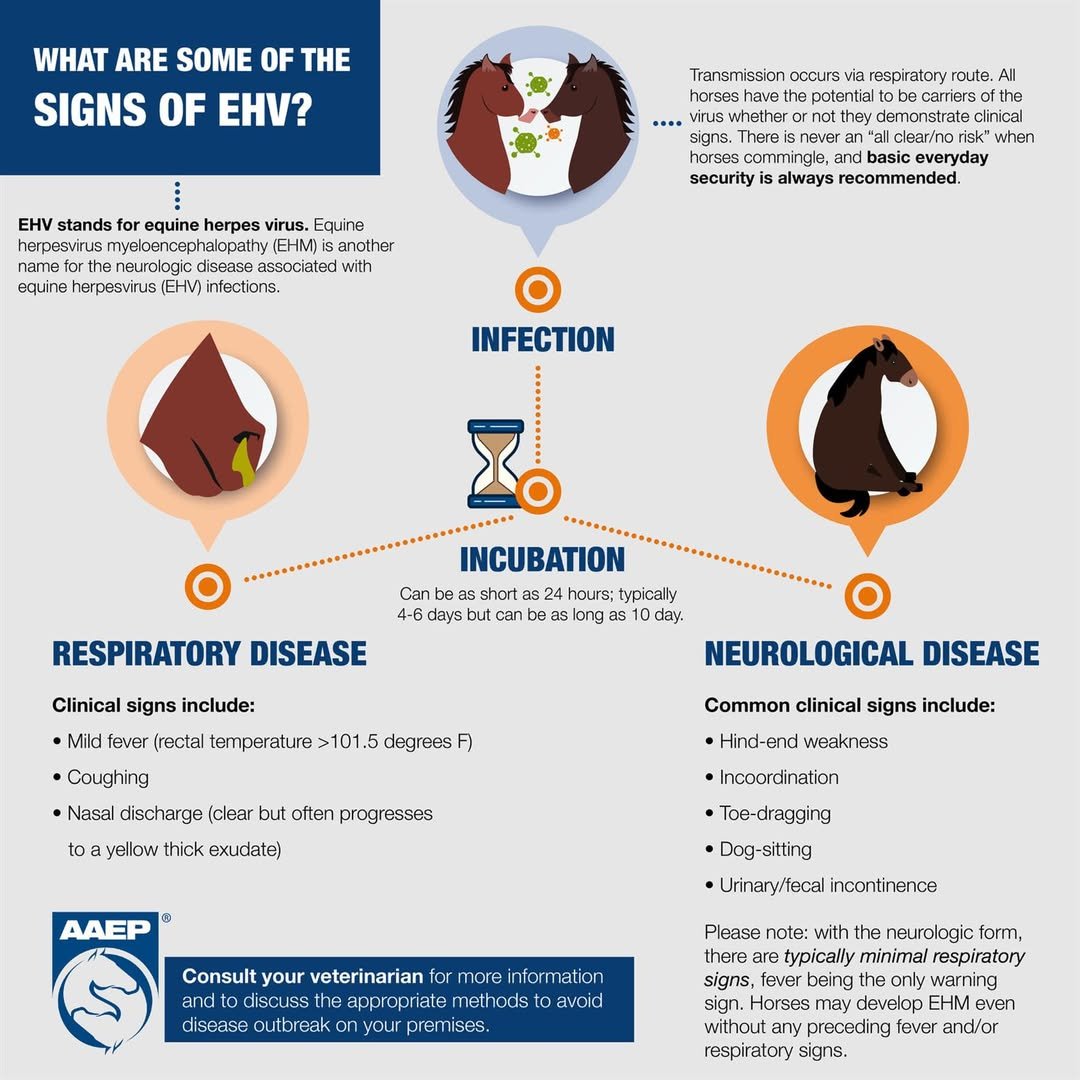Updates on EHV-1 (LAST UPDATED 11/26/25)
Here’s the latest Update from CA Food & Agriculture Department:
November 19, 2025: CDFA is aware of the ongoing EHV-1 outbreak that has confirmed cases in multiple other states. As of today, there are NO confirmed cases in California. CDFA has been in direct contact with California competitors from the three known exposure events and recommended quarantine with isolation, twice daily temperature monitoring, and increased biosecurity.
The California borders remain open to equine travel with only the regular interstate travel requirements at this time (health certificate within 30 days and an EIA test (Coggins) within 12 months). CDFA recommends anyone returning to California from these events to isolate their horses away from any other equids for 21 days along with implementing the clinical monitoring and biosecurity measures.
Any confirmed cases in California will be posted here as CDFA will continue to actively monitor the situation. Alerts for national cases for this EHV-1 outbreak can be found at the Equine Disease Communication Center: https://equinediseasecc.org/news/article/Equine-Herpesvirus-Myeloencephalopathy-(EHM)-Outbreak.
CDFA strongly recommends that horse owners practice proper biosecurity when around other horses. Compliance with basic biosecurity practices is an important factor in reducing risk of exposure to all contagious equine diseases. Basic biosecurity measures to follow to decrease potential disease spread at equine events include:
Limit horse-to-horse contact
Limit horse-to-human-to-horse contact
Avoid use of communal water sources
Avoid sharing of equipment unless thoroughly cleaned and disinfected between uses
Monitor your horse for clinical signs of disease and report any temperature over 102°F to a veterinarian
FOR LAEC BOARDERS/TRAINERS:
Your horses’ well-being is our top priority. LAEC follows established, evidence-based biosecurity practices aligned with USEF and the California State Veterinarian. This includes:
mandatory health documentation for all new horses
required temperature logs during their arrival window
vaccination compliance
reinforced hygiene protocols
We work closely with our horse show partners to follow all guidelines set forth by USEF and other governing bodies, ensuring that competitions on property maintain the highest level of biosecurity and safety.
We encourage these best practices:
regularly monitor temperatures
avoid shared buckets or equipment
practice good hand hygiene
promptly report any concerns to management
Our team monitors guidance from veterinary and regulatory agencies and will keep the community updated with developments. Thank you for your ongoing partnership in maintaining a safe and healthy environment for all horses at LAEC.
EHV-1 Update And Biosecurity Reminders From US Equestrian:
Ensure compliance with USEF EHV-1 and Influenza vaccination requirement (within 6 months of entry to venue)
Twice daily temperature taking and recording
Immediate reporting of a febrile horse (temperature over 101.5F) as per USEF Rule
Observe horses for clinical signs of disease and report any clinical signs to the veterinarian
Avoid sharing of equipment without cleaning and disinfecting between uses
Limit horse to horse contact (maintain separation while walking or riding or driving)
Limit individuals touching horses to essential personnel
Ensure horse trailers are properly cleaned and disinfected between loads of horses, especially those loads containing sick horses
Learn more: https://www.usef.org/media/press-releases/ehv-1-update-biosecurity-reminders-from-us

